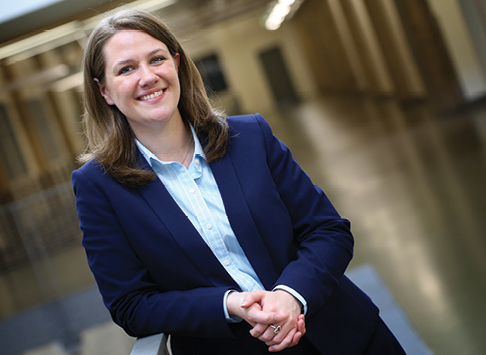Building for the future
BU’s first mechanical engineering PhD student takes a stellar path
by Eric Eckert
For Sarah Stair, BSME ’12, a National Science Foundation (NSF) Graduate Research Fellowship recipient and soon to be Baylor mechanical engineering doctoral candidate, her passion for science, engineering and math began simply. It started with building Lego towers.
She advanced to constructing weight-bearing bridges out of paper and participating in egg-drop contests—a traditional path for encouraging students to tackle STEM careers. In high school, varsity volleyball and tennis competed with the math team for her attention and participation. Her zeal for calculations solidified her direction.
“I asked different people, ‘What combines science and math really well?’ and everybody said engineering,” Stair says, adding that she was influenced by her father, an engineer in the aerospace industry.
She chose the School of Engineering and Computer Science (ECS) at Baylor to begin her studies and anticipates completing the Master of Science in Mechanical Engineering program in August. One of her mechanical engineering professors, Dr. Walter Bradley, introduced her to research through an internship. “I fell in love with it,” she says.
Stair’s research in materials science has led to awards, publications, a prestigious national fellowship and a top-tier internship.
“This has been such a phenomenal working environment—from the students to the professors, for the opportunities that have opened up since I’ve been here,” Stair says of Baylor. “I would’ve never thought that I’d have all of these opportunities or the NSF grant or anything like this two years ago.”
The NSF Graduate Research Fellowship includes three years of support, a $32,000 annual stipend, a $12,000 cost-of-education allowance to the institution, international research and professional development opportunities, and access to the XSEDE Supercomputer. Past recipients of the fellowship include U.S. Secretary of Energy Steven Chu, Google founder Sergey Brin and several Nobel Prize winners.
She also landed a coveted two-month internship at Sandia National Laboratories in New Mexico and will begin the fall 2014 semester in the research-oriented Doctor of Mechanical Engineering program. She is the first candidate accepted into the program, approved by the Regents in fall 2013. Baylor ECS, long recognized as a top undergraduate engineering program, is steadily and strategically growing its graduate programs with the mechanical engineering doctorate program as the latest addition to help the school fulfill its mission of advancing rigorous scholarship in the field of engineering within the context of Baylor’s faith foundation and Christian perspective.
Stair’s graduate research centers on the development of non-destructive testing techniques—specifically, the use of ultrasound—for carbon fiber composite materials. The research can be used by the aerospace and transportation industries, Stair explains.
Her internship at Sandia will touch on that work.
“Sandia is definitely on the leading edge of research,” Stair says. “They’re developing new technology that you’re going to see maybe in a few years.”
As a doctoral candidate at Baylor, she plans to continue working with her advisor, Dr. David Jack, assistant professor of mechanical engineering, on the ultrasound research.
“That’s definitely a passion of mine. I’ve enjoyed working with that, and making the composites here in the lab. I’d love to further my education and continue working with the research here,” Stair says.
Most of their work is conducted in the Materials Characterization Lab in the Baylor Research and Innovation Collaborative (BRIC).
“Sarah is one of the hardest working students I’ve ever been associated with,” Jack says. “Not only is she good in the lab, but she’s good on the theoretical side of things. I know that wherever she goes, she will rise to the top of any group.”
